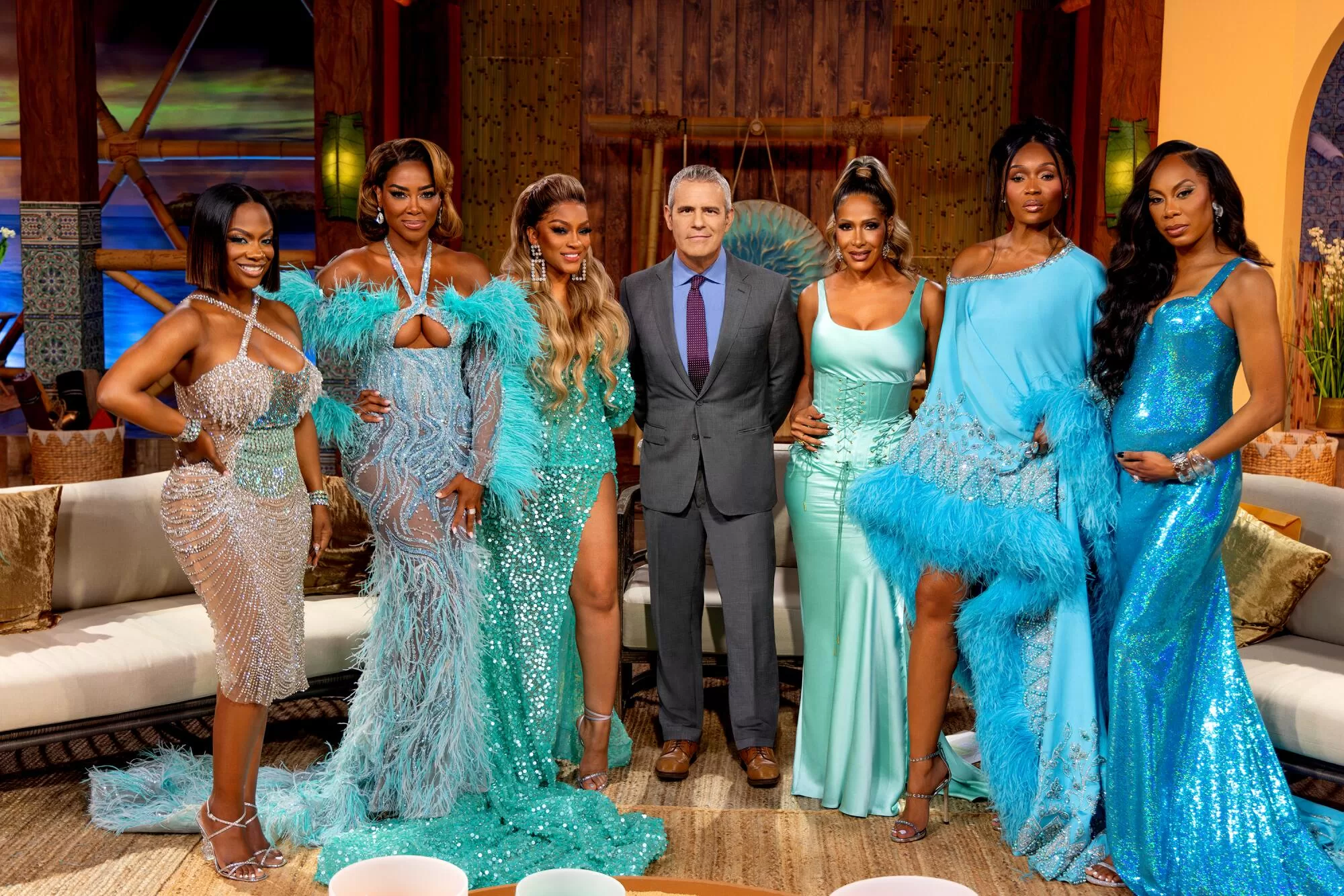He loved the beautiful characters in the fictional town of Pine Valley, their over-the-top drama and, of course, Susan Lucci, who starred as the iconic Erica Kane.
In 2006, as a programming executive at the then fledgling cable network Bravo TV, Cohen transformed his fascination into a new series: “The Real Housewives of Orange County.”
“He’s seen as the personification of Bravo and he takes on almost this mythical status and becomes the really high-profile target of whatever grievances people might have,” said Alex Baskin, the executive producer of “Beverly Hills,” “Orange County” and “Vanderpump Rules.”
But unlike Pine Valley, the show’s nonstop drama chronicled the relationships, fights, divorces, infidelities and financial woes of real people who are wealthy and glamorous.
“I didn’t know I’d go on to be ringleader to a fabulous galaxy of women starring in a real-life soap opera,” wrote Cohen in his bestselling memoir “Most Talkative.”
Today, there are 11 “Real Housewives” franchises, from Beverly Hills to Dubai (plus 13 international adaptations currently), as well as spinoffs including the hugely popular “Vanderpump Rules,” which have fueled Bravo’s voyeuristic unscripted programming and reinvented a genre of television. “Bravolebrity” is part of the lexicon, and the reality stars’ antics have become modern-day water-cooler fodder.
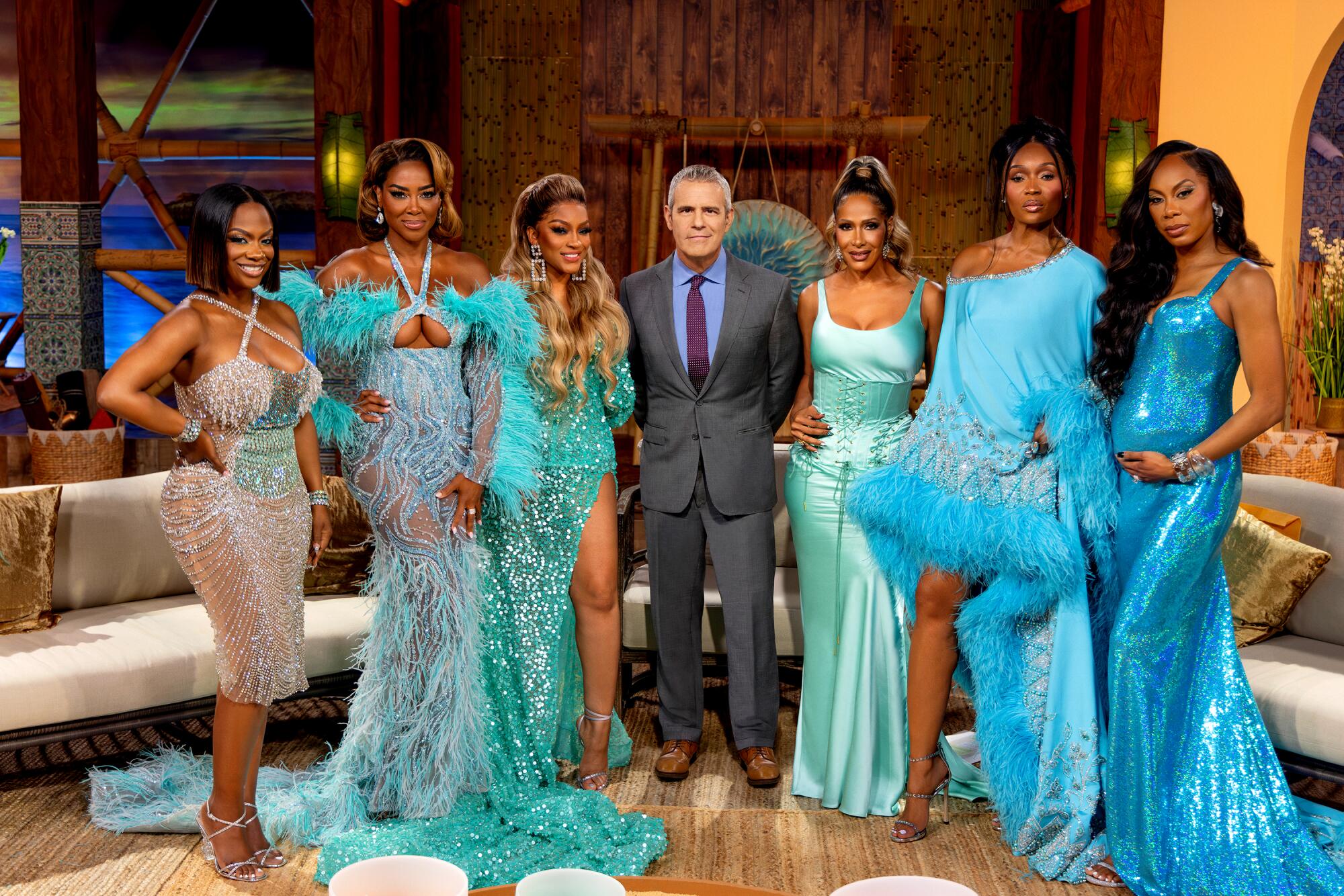
“The Real Housewives of Atlanta” reunion featured Kandi Burruss, left, Kenya Moore, Drew Sidors, Andy Cohen, Sheree Whitfield, Marlo Hampton and Sanya Richards Ross.
(Jocelyn Prescod / Bravo)
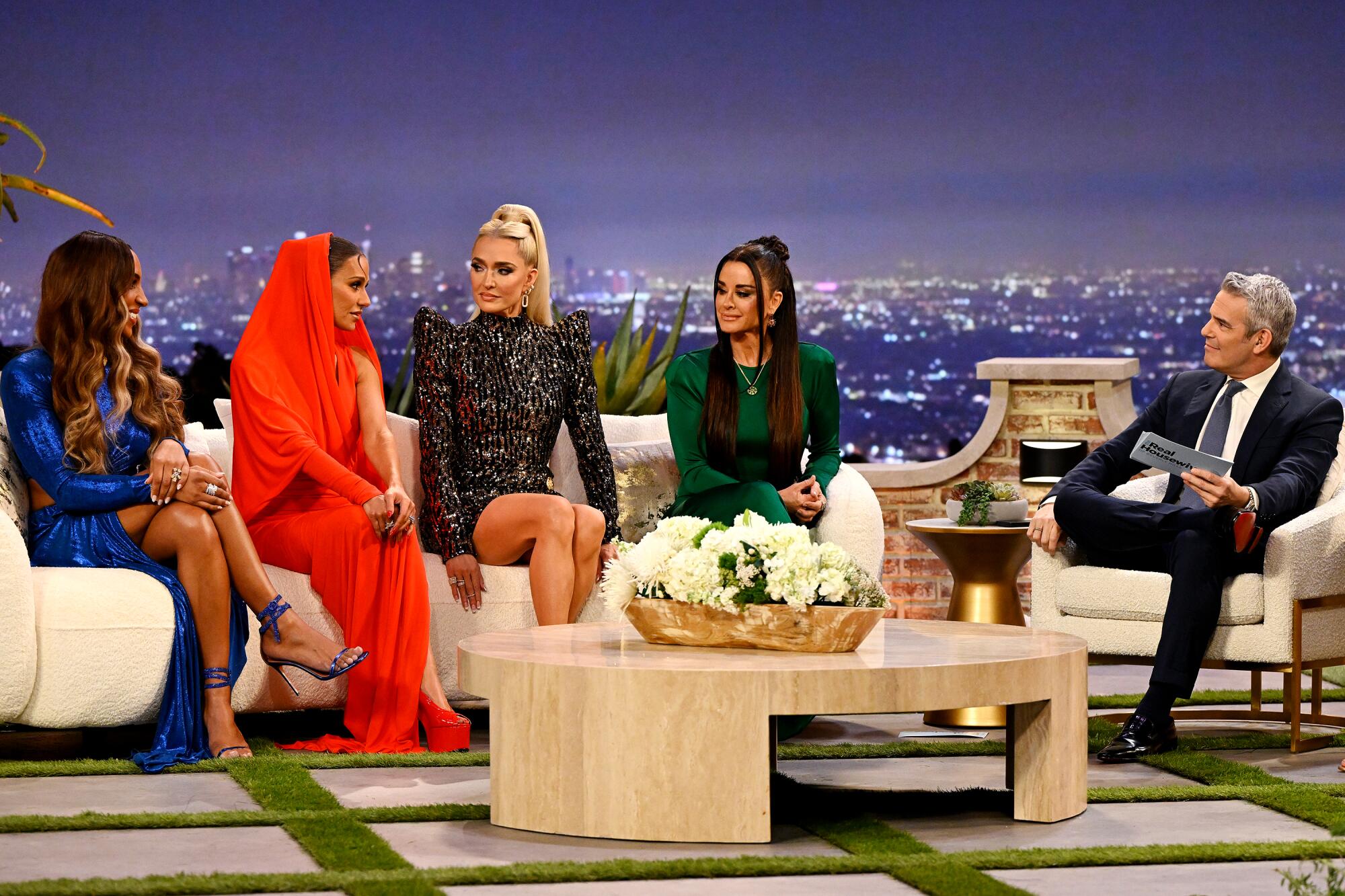
Andy Cohen hosts the most recent “The Real Housewives of Beverly Hills” reunion with, from left, Annemarie Wiley, Dorit Kemsley, Erika Jayne and Kyle Richards.
(Griffin Nagel / Bravo)
But the very same mascara-streaked moments that have made for ratings gold have come under fire. A slew of allegations and lawsuits claiming bullying, harassment, misogyny, racism and unfair labor practices have been leveled at Bravo and the shows’ producers. And Cohen, as the face of the network, has drawn particular scrutiny, portrayed by his detractors in lawsuits and in interviews as a reality TV Svengali who pits women against one another. They allege he fosters toxic workplace conditions in order to create onscreen drama.
Bravo has said it is committed to a safe workplace. Cohen has denied any wrongdoing, with a number of the network’s stars and others dismissing the critics as “desperate” sensationalists.
“He’s seen as the personification of Bravo and he takes on almost this mythical status and becomes the really high-profile target of whatever grievances people might have,” said Alex Baskin, the executive producer of “Beverly Hills,” “Orange County” and “Vanderpump Rules.”

Before Bravo emerged out of reality TV’s primordial soup, it began as a fine arts cable channel in 1980.
Bravo was the kind of stop on the dial where Federico Fellini films were shown along with jazz and ballet performances. For years, its signature show was “Inside the Actors Studio.”
Then in 2002, NBC, which owned a stake in Bravo, acquired the channel for $1.25 billion, giving the network Bravo’s upscale audience and a toehold in basic cable. Two years later, NBC merged with Vivendi Universal Entertainment, becoming NBCUniversal.
Lauren Zalaznick, who ran NBC’s short-lived but well-regarded pop culture cable channel Trio, was tapped to be Bravo’s president. “Nobody cared about cable. … Nobody wanted or believed a channel like Bravo could be anything more than a niche,” she said, “except my small team,” which included Cohen, also a Trio transplant.
In 1990, Cohen arrived in New York armed with a degree in broadcast journalism from Boston University and eclectic taste. In addition to “All My Children,” he was a fan of “Battle of the Network Stars,” Madonna and legendary ABC White House correspondent Sam Donaldson. He dreamed of becoming a television anchor. However, during a college internship at CBS News, an industry veteran discouraged him, saying Cohen’s lazy eye would be a problem.
Cohen worked his way up, mostly, behind the scenes as a producer and booker for CBS’ struggling morning programs, “CBS This Morning” and “The Early Show,” and newsmagazine “48 Hours.” He honed his interviewing skills, learning to shift between hard news segments and dishier celebrity profiles.
It also was during this time that Cohen became popular among the media glitterati, including Anderson Cooper and Sarah Jessica Parker, most of whom remain part of his inner circle.
“I didn’t know I’d go on to be ringleader to a fabulous galaxy of women starring in a real-life soap opera,” wrote Cohen in his bestselling memoir “Most Talkative.”
“He met a lot of people through producing them and that evolved into friendships,” said Liza Persky, a television producer who bonded with Cohen 30 years ago over their shared love of Lucci. “When you meet him, you just want to be his friend.”
Although Cohen was named Bravo’s vice president of original programming, Zalaznick was initially skeptical, given his news producing background. But she soon was won over.
Cohen was “ebullient, positive and an optimist,” said Zalaznick, who left Bravo in 2013. “He breaks down things that happen on TV or in the culture, and gives them attributes that viewers or non-celebs can relate to: happiness, sadness, jealousy, exuberance, romance.”
In 2003, Bravo aired the makeover reality series “Queer Eye for the Straight Guy.” It was a massive hit. A year later it won an Emmy.
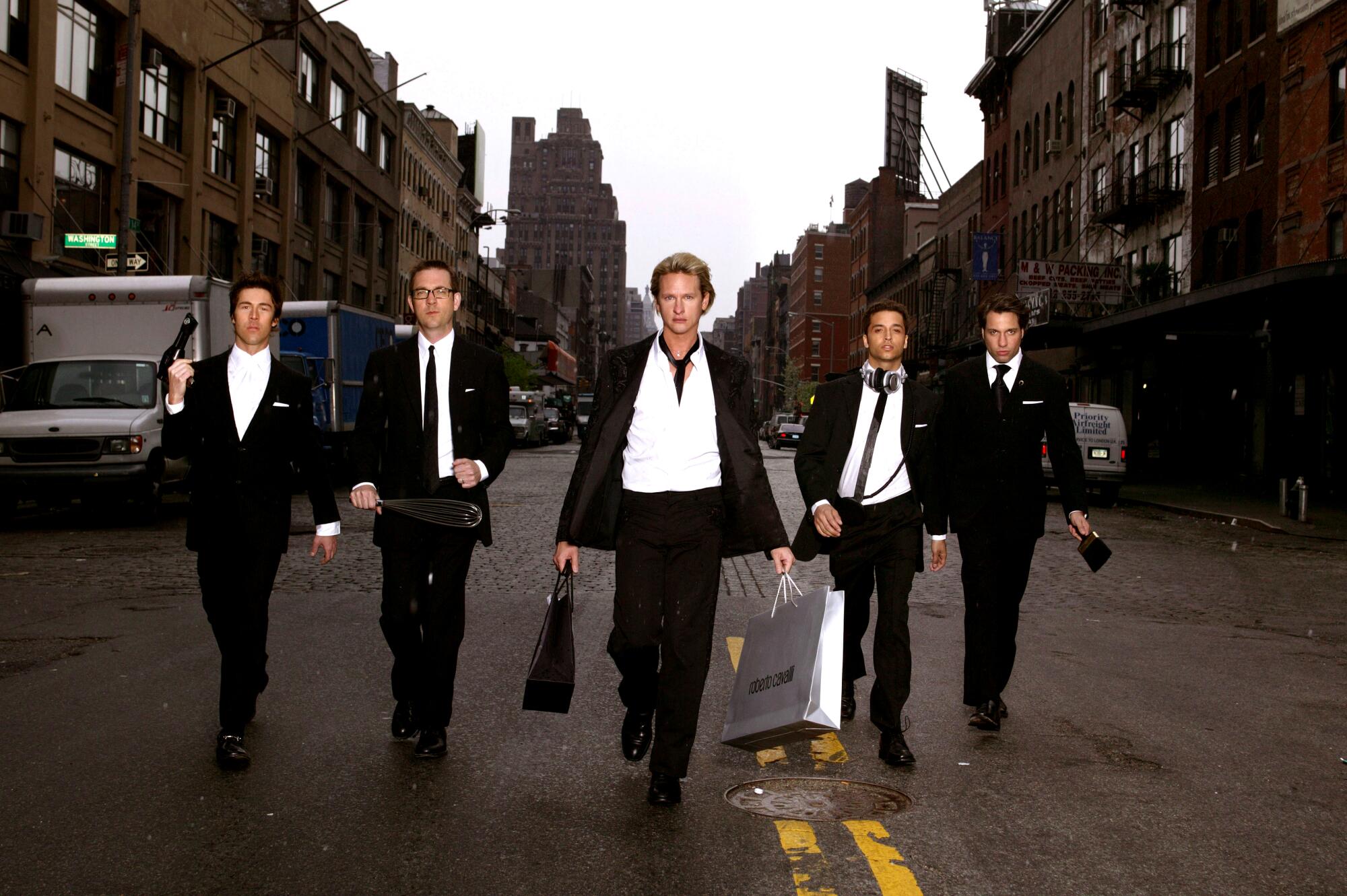
The original “Queer Eye for the Straight Guy” was a massive hit that changed the direction of Bravo TV.
(Craig Blankenhorn / Bravo)
“Queer Eye” marked Bravo’s pivot from art house to reality TV funhouse.
As Bravo’s ringmaster, Cohen, who arrived in 2004, helped the network develop shows that revolved around food, fashion and design. Other breakout hits like “Project Runway” and “Top Chef” followed.
But it was the explosive success of “Real Housewives of Orange County” (bolstered by endless marathons) that turned Bravo into a pop culture sensation and Cohen into a household name. Within four years, “The Real Housewives” added offshoots in New York, New Jersey, Beverly Hills, Atlanta and Washington, D.C.
Cohen is executive producer of all of the “Real Housewives” shows and host of the nightly talk show “Watch What Happens Live” as well as reunions across the network. (He stepped down from his network executive role in 2013.)
The Bravoverse expanded with a slate of docuseries including “Million Dollar Listing” and “Below Deck,” many of which continue to spawn spinoffs (“The Valley” is the latest) and tap into the public’s fascination with the rich.
That fascination is heightened by the so-called Bravo wink — a gently ironic style of editing that allows for a distance between the audience and the outrageous behavior they’re watching.
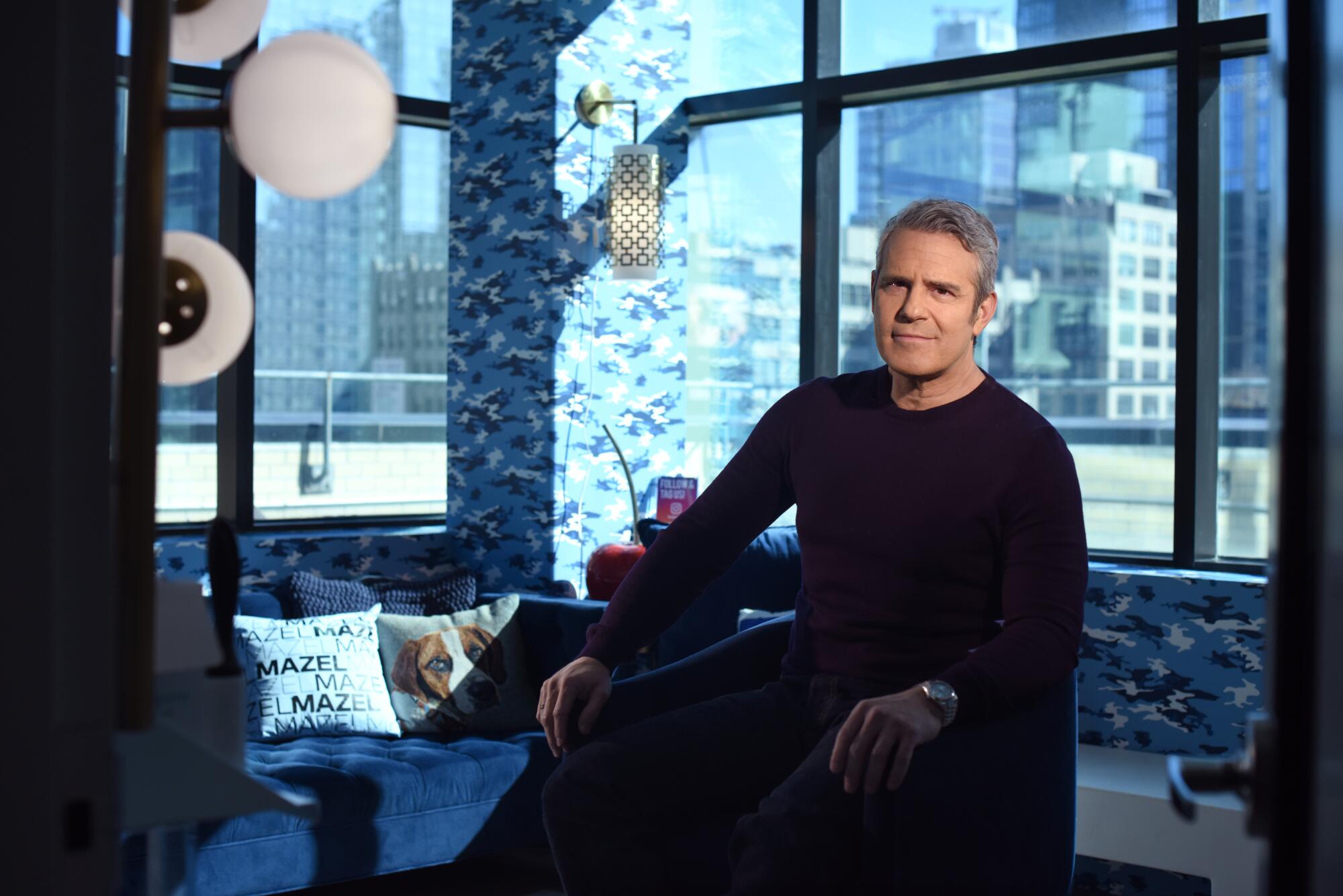
In addition to hosting the nightly talk show “Watch What Happens Live,” Andy Cohen is the executive producer of all 11 “Real Housewives” franchises.
(Jennifer S. Altman / For The Times)
“No one loves the shows more than Andy does,” Baskin said. “I think he provides the perspective of the audience. He has a great sense of humor and an eye for ludicrous, odd eccentricities that become breakout moments for viewers.”
Like the time New Jersey housewife Teresa Giudice flipped a table while screaming “prostitution whore” at fellow housewife Danielle Staub, or the national security incident that ensued when D.C. housewife Michaele Salahi and her then-husband, Tareq, crashed a White House state dinner for the prime minister of India.
Cohen’s irreverent emails to Zalaznick about the shows in production eventually led to his hosting online aftershows and the often contentious “Real Housewives” reunions.
Newsletter
Subscriber Exclusive Alert
If you’re an L.A. Times subscriber, you can sign up to get alerts about early or entirely exclusive content.
You may occasionally receive promotional content from the Los Angeles Times.
The online programs showcased his sensibilities and captured the audience’s interest in real time, with Cohen often reading their tweets and questions off social media.
Cohen, who had done bit parts onscreen (he played a shirtless extra in a gay bar on “Sex and the City”), became a singular on-camera presence. In 2009 he began hosting Bravo’s weekly talk show, “Watch What Happens Live” (“WWHL”), which expanded to five nights a week in 2011.
A freewheeling affair, it is broadcast live (most nights) from the so-called Bravo clubhouse, an intimate studio decorated with kitschy memorabilia, where Bravolebrities mingle with Oscar winners — many of whom are self-described Bravo fans — in the ultimate clash of high and low culture. During one episode, Amy Schumer likened the final moments of last year’s “Vanderpump Rules” reunion to the end of “Schindler’s List.”
With “WWHL,” Cohen broke the late-night model — and not just because he is the only openly gay host in American late-night TV. There are games like “Shag Marry Kill” and the recurring feature “Clubhouse Playhouse,” where A-list stars reenact memorable scenes from Bravo shows; think Natalie Portman spitting out the line, “If this is what mediocre looks like, I’m very happy being mediocre,” channeling an epic Salt Lake City fight.
And there is a rotating non-celebrity bartender, usually connected to something Cohen wants to spotlight, such as a restaurant, a play, even his parents.
“WWHL” became a show around fandom, and Cohen is both host and superfan. He asks personal questions that catch famous people off-guard and yield surprisingly honest answers.
On the show Julia Roberts revealed that mushrooms are the hardest drug she has tried. Liam Neeson confirmed the rumor that he is, as Cohen put it, “the most well-endowed person in Hollywood.”
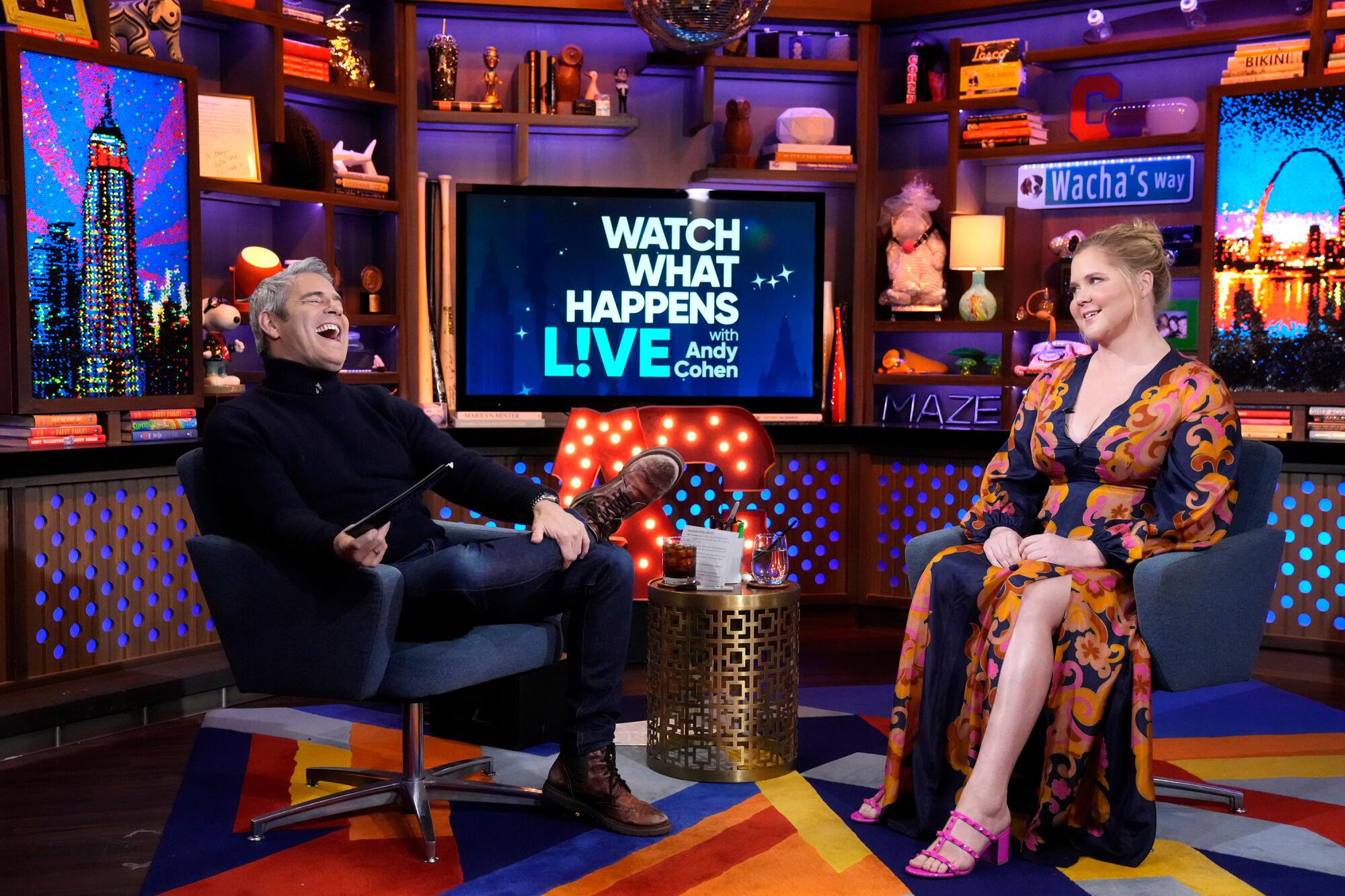
Andy Cohen interviews Amy Schumer, one of Bravo’s self-described celebrity superfans, on “Watch What Happens Live.”
(Charles Sykes / Bravo)
The combination of soapy spectacle and celebrity has spawned multiple businesses, from wine to skincare lines, launched by the Bravolebrities. (There is no shortage of people lining up to be cast on Bravo shows). And Cohen has become a multimedia tycoon with four bestsellers, a book imprint and two SiriusXM radio channels.
In 2019, the network debuted BravoCon, a three-day spectacle billed as the place “where Bravoholics and Future Bravolebs come together to celebrate their fandom.”
Bravo hosts some of the most-watched shows on TV — the season premiere of “Vanderpump Rules” this year drew a record 3.2 million viewers. While Bravo’s overall average prime-time audience dropped last year by 4.45%, the decline was much less than for other basic-cable channels.
“Outside of sports, film and news, Bravo remains the biggest and most important pillar inside the NBC ecosystem, particularly with regard to Peacock usage,” said Evan Shapiro, a media analyst, adding that the franchises “have been carrying a huge part of the portfolio for that company for some time.”
Two years ago, after NBC’s streaming service, Peacock, was named the official home of Bravo content, Jeff Shell, NBCUniversal’s former CEO, hailed Bravo programming as a key driver of new subscribers.

But there is a dark side to Bravo’s compelling entertainment.
In 2011 Russell Armstrong, husband of Beverly Hills housewife Taylor Armstrong, died by suicide amid allegations that he had physically abused his wife, which became a storyline that surfaced on the show.
More recently, “Vanderpump Rules” star Rachel Leviss entered an in-patient mental health facility after last year’s season in which her affair with castmate Tom Sandoval became a national scandal, earning it the sobriquet “Scandoval.”
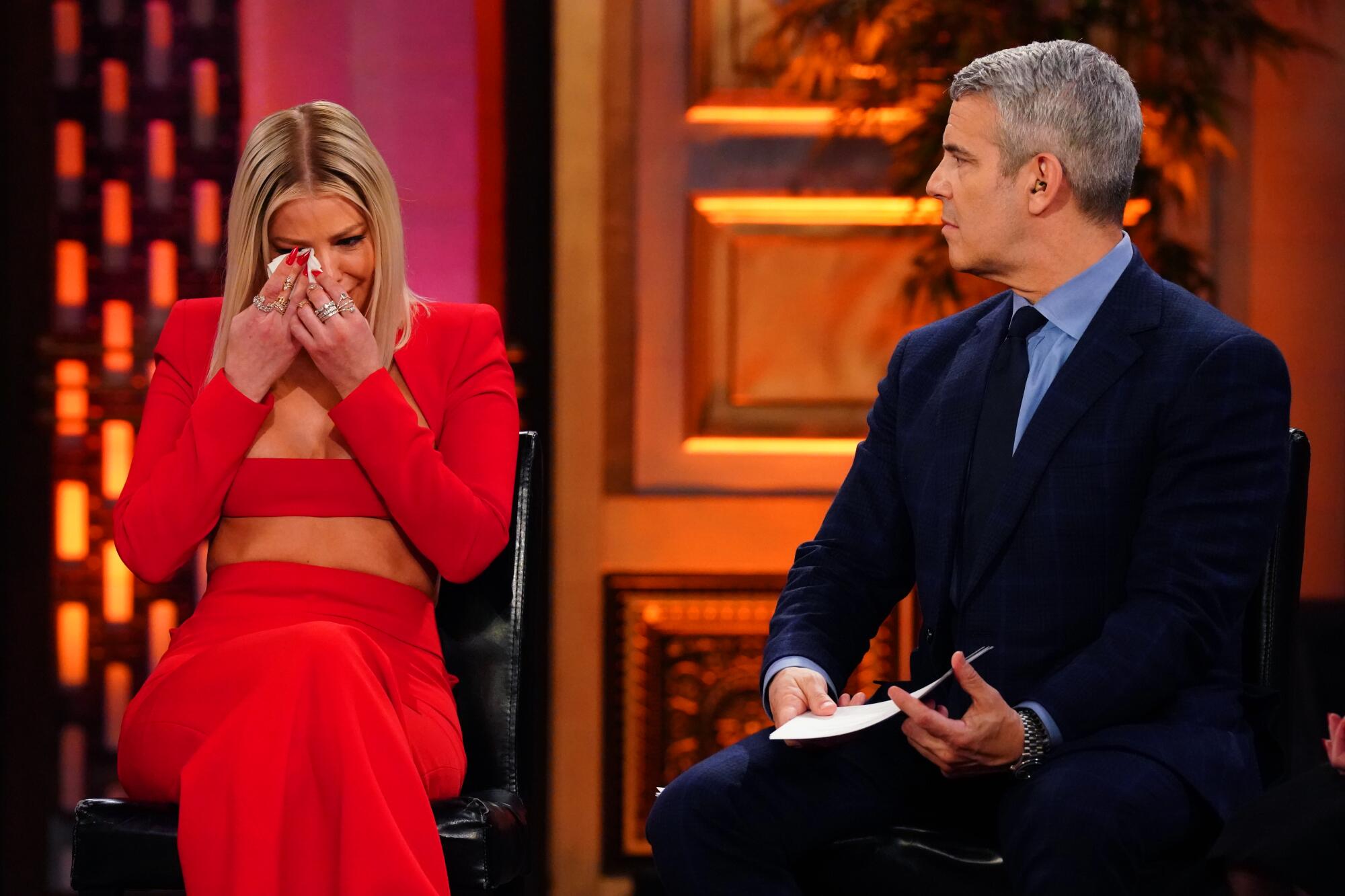
Ariana Madix, a “Vanderpump Rules” star, with Andy Cohen during last year’s reunion show following the explosive “Scandoval” storyline.
(Nicole Weingart / Bravo)
In the wake of George Floyd’s murder, Bravo came under fire for its failure to cast people of color in some of its most popular shows until recently. Attempts to integrate “New York” and “Dallas” ended disastrously, leading to racially charged confrontations among the cast members. “New York” was entirely recast and “Dallas” was effectively canceled.
Despite the network’s aspirational brand, numerous cast members have faced bankruptcy and foreclosure. Some have even been convicted of financial crimes, including Jen Shah, the Salt Lake housewife who pleaded guilty to conspiracy to commit wire fraud and is currently serving a 6½-year prison sentence.
Feminist icon Gloria Steinem excoriated “Real Housewives,” saying in 2013, “It is women all dressed up and inflated and plastic surgeried and false bosomed. … It is a minstrel show for women.”
The steady drumbeat of criticism has grown louder in recent months thanks to the vocal complaints of Bethenny Frankel, a breakout star from the original New York cast, who sold her low-calorie cocktail company, Skinnygirl, for a reported sum of $100 million in 2011.
Last summer, while Hollywood writers and actors were on strike, Frankel began a social media campaign urging her fellow reality TV stars to form a union and push for improved compensation and working conditions. She denounced much of reality TV — a genre that she claims exploits vulnerable people in their darkest moments. And she has criticized Cohen for allegedly pitting women against one another. “He gets richer while these women kill each other,” she told The Times in November.
Cohen declined comment. A person close to the producer said: “This is typical, hypocritical rubbish.”
Bravo is facing a flurry of lawsuits and legal complaints from former stars of its programming.
In January, Caroline Manzo, an original New Jersey cast member, sued Bravo, Peacock and other parties, alleging that she was sexually assaulted by Brandi Glanville, a former Beverly Hills housewife, during production of the streaming spinoff “Ultimate Girls Trip” in Morocco. The season has not yet aired on Peacock. Manzo alleged that producers “regularly ply the Real Housewives cast with alcohol, cause them to become severely intoxicated, and then direct, encourage and/or allow them to sexually harass other cast members because that is good for ratings,” according to the complaint.
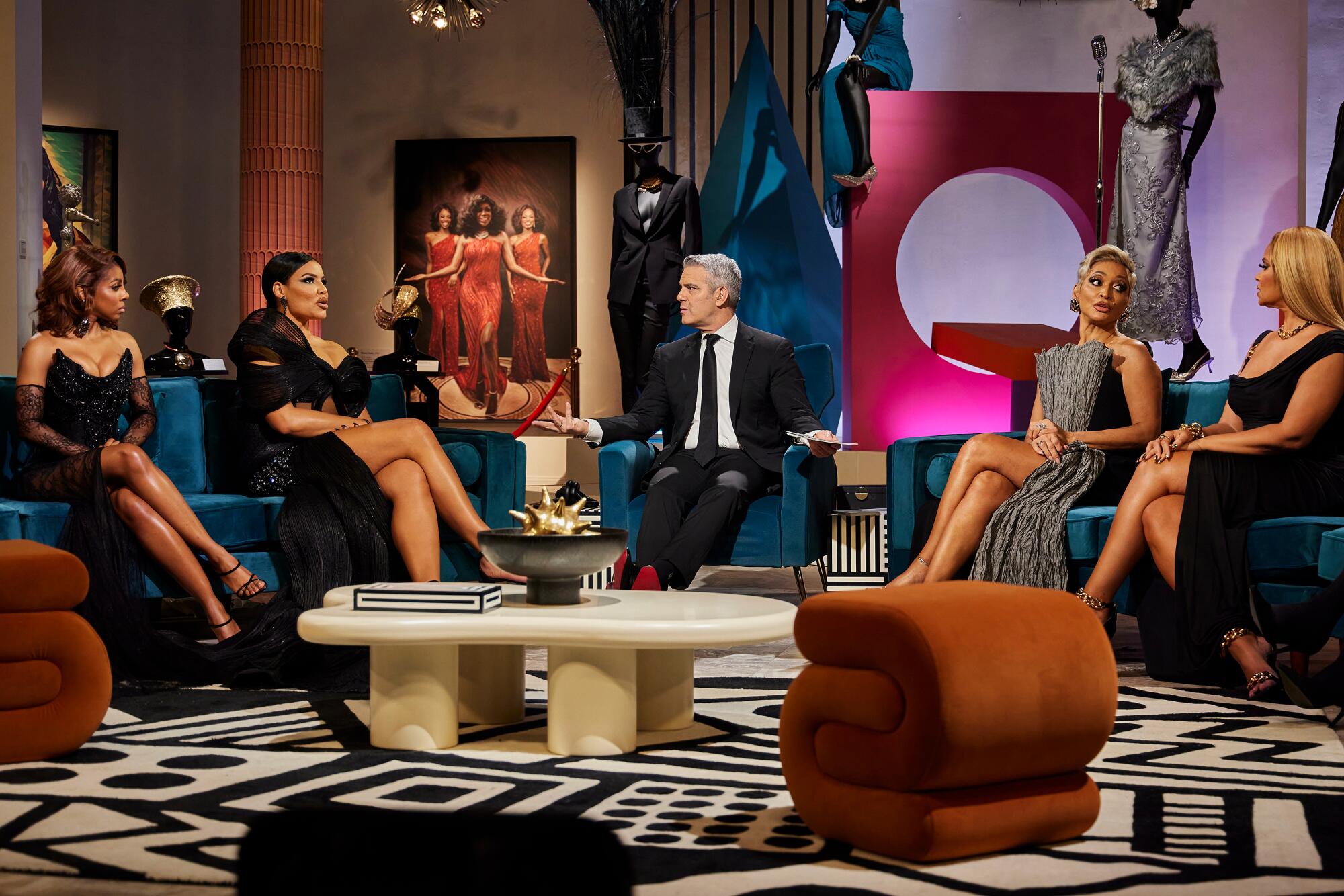
Andy Cohen with the cast of “The Real Housewives of Potomac,” from left: Candiace Dillard Bassett, Mia Thornton, Karen Huger and Gizelle Bryant.
(Jocelyn Prescod / Bravo)
Marco Vega, hired to work as a butler during an “Ultimate Girls Trip” to the Berkshires, sued Bravo and its affiliates last year, alleging that during filming he was also sexually assaulted and abused by Glanville, who was not named as a defendant in either the Manzo or Vega lawsuits. According to the complaint, the producers, including Bravo, “had overwhelming prior notice of Ms. Glanville’s prior deviant sexual proclivities and sexually harassing conduct”; it also alleged that her conduct was “allowed, condoned and even encouraged.”
Glanville’s lawyer Bryan Freedman did not respond to requests for comment. In March, Glanville denied Manzo’s allegations on X, formerly Twitter, saying, “It’s BS & Caroline was fine.” Last December, on X she called the Vega claims “character assassination,” saying that she had followed directions from the producer.
Derek Smith, the attorney representing both Manzo and Vega, did not respond to requests for comment.
“The safety and security of cast and crew while shooting is extremely important and we take all reports seriously,” said Bravo in a statement, in response to Manzo’s suit. “In this situation, production immediately launched a comprehensive review and took appropriate action.”
Responding to the Vega complaint, a Bravo spokesperson said: “He never filed any kind of complaint or raised any issues, so the first time we heard about this was years later through the lawsuit.”
In January, Bravo and the show’s producers filed a motion to dismiss Vega’s case.
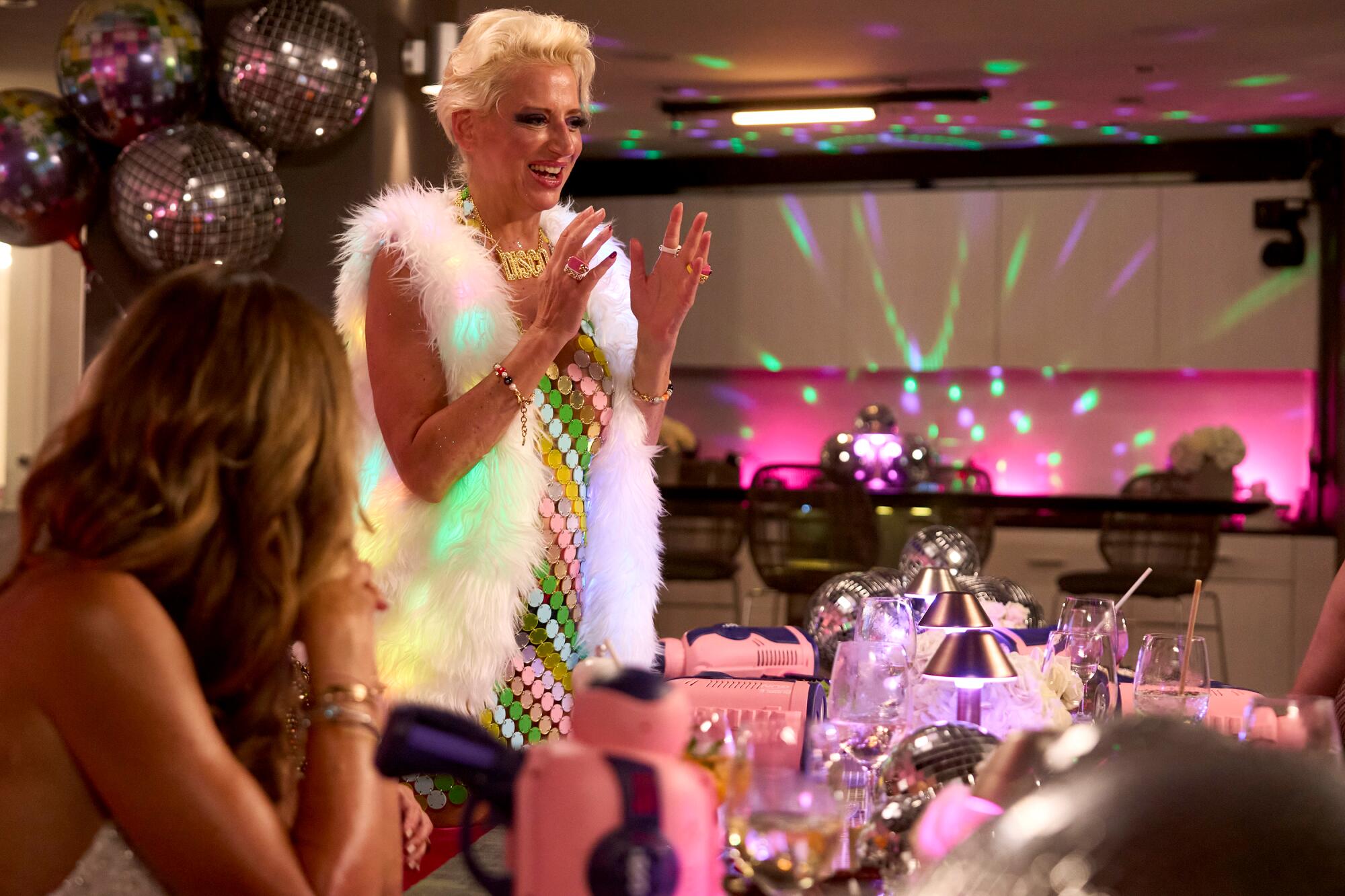
“The Real Housewives of New York City” alum Dorinda Medley on the Peacock spinoff “Ultimate Girls Trip.”
(Clifton Prescod / Peacock)
Cohen was not named in either lawsuit.
Attorneys for Glanville have alleged the producer made sexually offensive remarks about another cast member.
In a video sent to Glanville in 2022, Cohen allegedly “boasted of his intention to sleep with another Bravo star that night while thinking of her and invited her to watch via Facetime,” attorneys Mark Geragos and Freedman said in a February letter to Bravo.
“This was an extraordinary abuse of power that left Ms. Glanville feeling trapped and disgusted,” Geragos and Freedman wrote in the letter.
Cohen apologized on X. “It was absolutely meant in jest, and Brandi’s response clearly communicated she was in on the joke. That said, it was totally inappropriate and I apologize,” he said.
Later that month, Leah McSweeney, who starred in “The Real Housewives of New York City” and “Ultimate Girls Trip,” sued Bravo and Cohen, alleging she was pressured to consume alcohol while starring on the show, and that Cohen “intentionally uses cocaine with his employees to promote a workplace culture that thrives off drug and alcohol abuse.”
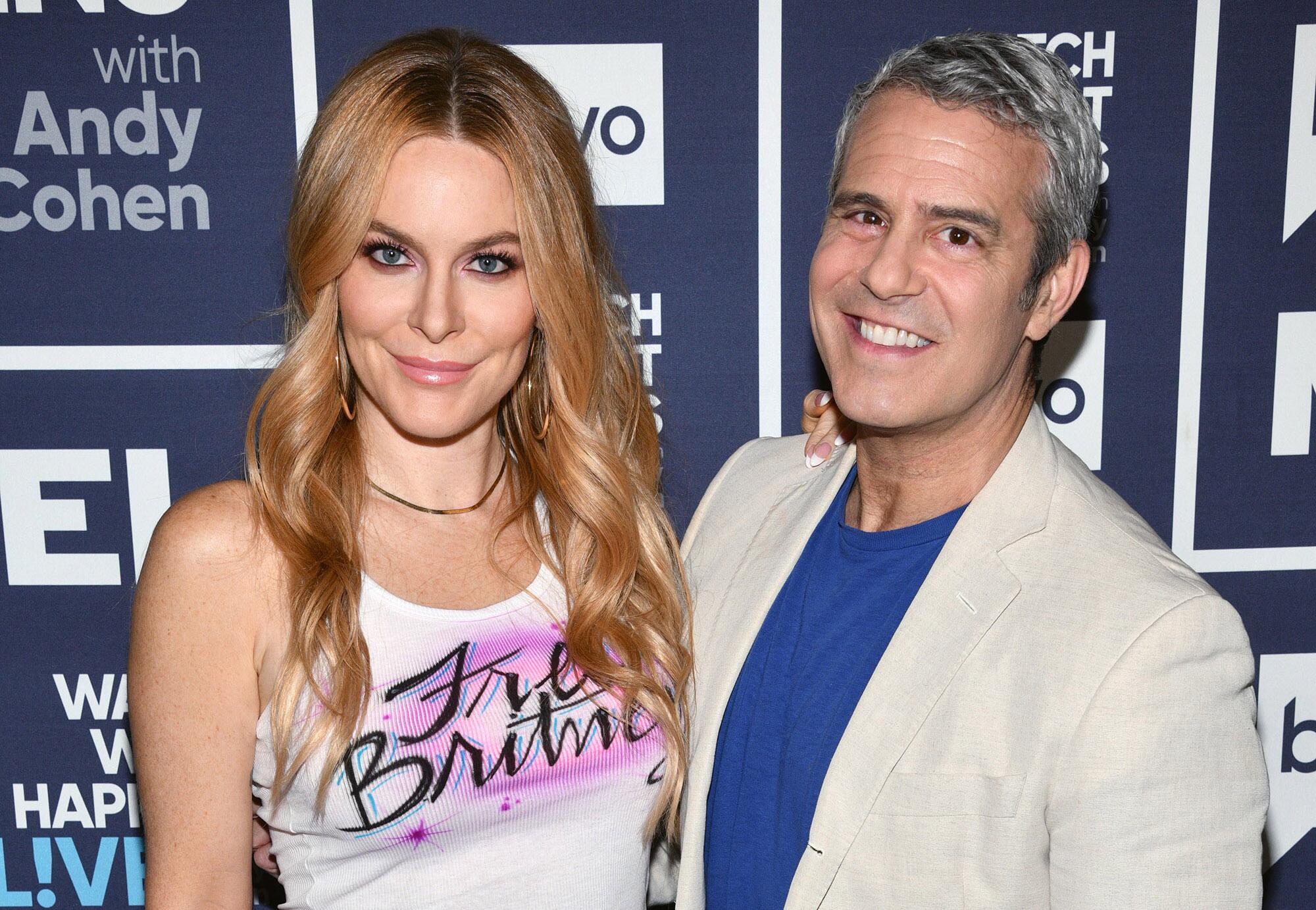
Former “New York” housewife Leah McSweeney is currently suing Andy Cohen, Bravo and the show’s producers.
(Bravo / NBCU Photo Bank via Getty Images)
In a statement, a spokesperson for NBCUniversal said that the network was “conducting an investigation into the recent allegations.”
In its statement, Bravo reiterated its commitment to “maintaining a safe and respectful workplace,” adding that it has been “working to enhance stricter guidelines on alcohol [and] implement psychological support and other measures with its third party production companies.” Further, Bravo said, “A number of claims that were made by Leah McSweeney were previously investigated and unsubstantiated.”
McSweeney’s attorney did not respond to a request for comment.
Cohen’s attorney, Orin Snyder, has strenuously denied the allegations.
In a letter sent to McSweeney’s attorneys, Snyder called the claims a “shakedown” and said the complaint was “littered with false, offensive, and defamatory statements” and demanded a public apology.
“Andy is a principled guy, who believes in right and wrong, and like anyone else is disappointed when people make false allegations against him,” Snyder told The Times.
For many in Cohen’s inner circle, the accusations against him are astonishing and perplexing.
“I love Andy, he’s loyal to a fault,” said producer Persky. “Andy has this quote in his book that ‘when you’re the hammer, everything’s a nail.’ And he’s a nail to a lot of these women.”
“This is a choice. No one’s forcing anyone to be a part of this incredible machine,” said “Orange County” star Heather Dubrow. “We’re so lucky to be a part of pop culture like this.”
Arguably, Cohen’s peculiar role at Bravo — as development executive turned on-air talent — has made him a target for broader criticism of its guilty-pleasure programming, where the lines can appear to be blurred.
Reality TV is “no stranger to problematic behavior,” said Danielle Lindemann, a Lehigh professor and author of “True Story: What Reality TV Says About Us.” The question is, “Is this a new age of reckoning where people are going to turn off their shows because they know what’s happening behind the scenes?”
“A lot of them view me as kind of their daddy in some weird, sick way, and their boss, and their friend, and their boyfriend, and their enemy — and so there’s a lot of different psychological layers happening in a situation like this,” Cohen told the New York Times. “Some of them are volatile women. So it’s all real. It’s all real.”
This dynamic has led to persistent criticism that Cohen plays favorites with the housewives, inviting the women he likes on to “WWHL” more often or going easy on them in reunions — like a latter-day Truman Capote manipulating a flock of 21st century swans. However, many of those in his orbit say he takes pains to maintain a professional distance.
One of his closest friends, Kelly Ripa, finds the current storm of claims against Cohen shocking and upsetting, calling him a “professional” who is “remarkable in his ability to draw those professional personal lines.”
When the “Housewives” franchise caught fire, she said that women in their social circle approached Cohen and made “a full court press to get on the show.”
“In some circumstances, I would listen to him actively say, ‘You have to understand what you’re signing up for. There’s not going to be preferential treatment,’” Ripa said.
Seven current and former “Real Housewives” cast members described Cohen as a compassionate colleague who was skilled at cultivating points of connection with them and liked to check in over text.
But each — including long-running cast members Kyle Richards (Beverly Hills) and Luann de Lesseps (New York) — said they had never had dinner with Cohen and rarely saw him outside of reunion tapings or appearances on “WWHL.” They also noted that he was not involved in day-to-day production of their shows.
Cohen is “removed intentionally, so you never get that close,” said Richards, adding, “There’s just so many of us.”
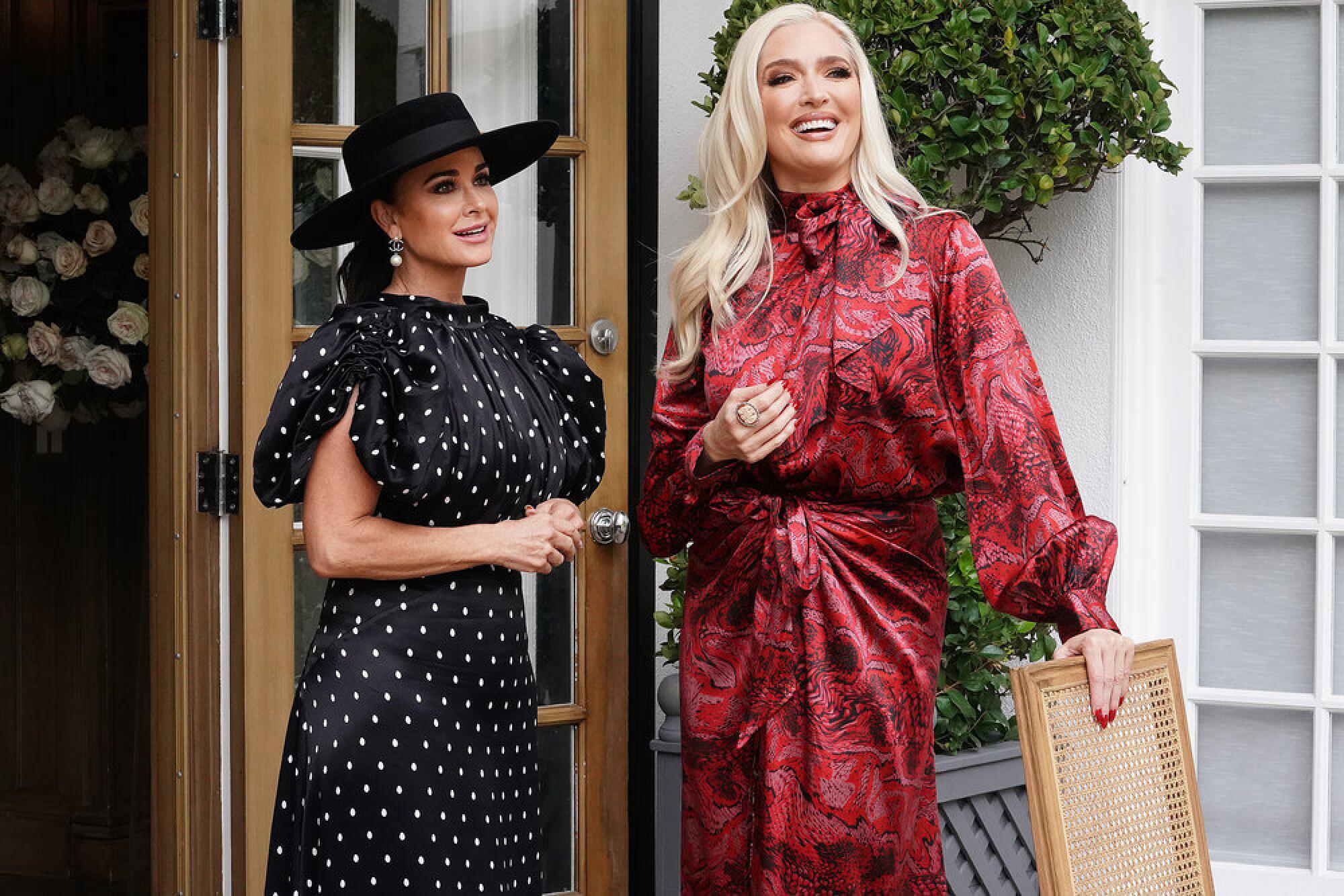
Beverly Hills Housewives Kyle Richards, left, and Erika Jayne.
(Nicole Weingart / Bravo)
Many of the housewives disputed the suggestion that they were induced into compromising behavior, particularly involving drinking for the sake of drama. They also expressed gratitude for the opportunities the shows provided for them as women in midlife.
“Every drink that you saw me drink, I took,’ said Dorinda Medley, who faced criticism for her drinking on “The Real Housewives of New York City.”
Wendy Osefo, a Potomac housewife, is pleased with how her show has embraced difficult conversations about representation: “We have tackled colorism and xenophobia. Even though those are very heavy issues, there has never been a time when Andy has shied away from it.”
As controversies and recriminations continue to swirl, it doesn’t appear that either the network or Cohen plans to rein in the antics. At least for now, they don’t need to.
According to Bravo, nearly every returning series has seen season-over-season growth among total viewers, with several on track to have their most watched seasons ever across platforms.
Reality TV is “no stranger to problematic behavior,” said Danielle Lindemann, a Lehigh professor and author of “True Story: What Reality TV Says About Us.” The question is, “Is this a new age of reckoning where people are going to turn off their shows because they know what’s happening behind the scenes?”
If you tuned into “WWHL” this month, the answer is no. There was Cohen playing “Pillow Talk!” with singer Ricky Martin, asking him “soft and fluffy” questions including: “In the bedroom do you believe it’s more about the size of the vessel or the motion of the ocean?” (His answer: “the size of the vessel.”)
For now, Cohen remains Bravo’s ringmaster and the circus is still in town.
